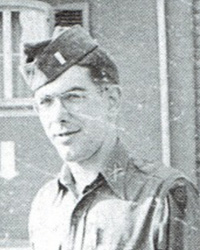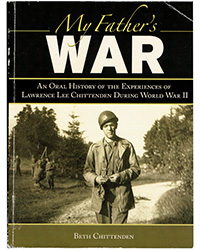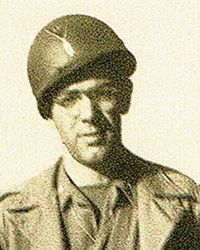Book 'My Fathers War'
by Elizabeth 'Beth' Chittenden
'My Father's War' by Beth Chittenden is subtitled "An Oral History of the Experiences of Lawrence Lee Chittenden During World War II." The large format book is printed on heavy stock and contains the complete oral history that Beth conducted with her father, who was a platoon leader in I Company of the 330th Infantry Regiment in Normandy and Brittany, and later was the regimental liaison officer (assistant S-3) for the 330th. The book is loaded with photos, maps, drawings, letters, and other documentation, many in full color. Excerpts from other 83rd histories are included to provide the time reference for the oral history. The result is an incredible odyssey that is almost impossible to put down once you have started to read it.
Copyright 2006, Silk Purse Press, 331 pages.
My book was signed and dedicated by the author to the late Captain Leo Hury who I happened to know as a good friend. It is amazing I was able to acquire this particular copy and it gives the book an important extra value.
Capt. Lawrence L. Chittenden
Captain
Lawrence L. Chittenden

Capt. Lawrence L. Chittenden
Lawrence Lee Chittenden was born June 12, 1921, in Tecumseh, Nebraska, to Ralph Chandler Chittenden and Anna Pauline (Buhlke) Chittenden. He had one brother, Leonard Alan Chittenden, born January 7,1928. Lawrence Chittenden graduated from Tecumseh Public High School in Tecumseh, Nebraska, in May 1939 and entered Kemper Military School, a junior military school in Booneville,Missouri, in September of 1939. He was 18 years old. His mother Anna died from stomach cancer in February 1940. After Kemper, Lawrence attended the University of Nebraska from September 1941 until February 1943, majoring in business administration.
On February 5, 1943, as an ROTC draftee, Lawrence Chittenden was inducted into the U. S. Armed Forces Infantry for his physical at the Enlistment Recruiting Center at Fort Crook in Omaha, Nebraska, as a private. He was 21 years old, 6’ 2” tall with blue/gray eyes, dark brown hair, 150 pounds and a ruddy complexion. February 15, 1943. At a major induction center in Fort Leavenworth, Kansas, Lawrence reported for active duty. Overnight he was made a Corporal. February 15 through May 28, 1943. At Fort Benning Ga. Lawrence attended Officer Candidate School with the 15th Company, Third Student Training Regiment, for three months and 14 days. He graduated May 28, 1943. On May 28, 1943, Lawrence Chittenden was honorably discharged out of the army as a Corporal, commissioned a 2nd lieutenant, and enlisted into active duty in the Army of the United States. His enlistment record shows him as a single man in good physical condition and excellent character. On May 29, 1943 he became active in Federal Service in the Army of the United States. He was 21 years old. He came home after OCS for a 10-day leave and then went to Camp Croft in Columbia, S.C. to an officer’s pool (unassigned officers). He was there 10 days and then assigned to the 83rd Infantry Division. June 23, 1943 through October 1943, Lawrence went from Camp Croft, South Carolina, to Nashville, Tennesee, (after a brief overnight stay at Camp Atterbury) for maneuvers and war games with the 83rd and met up with the whole Division. He was signed to the 330th Infantry, I Company, 3rd Platoon. They hiked to Camp Breckenridge in the northwest corner of Kentucky on September 12, 1943. All winter and early spring, until March 30, 1944 they spent doing maneuvers at Camp Breckenridge. On March 30, 1944, Lawrence was sent east to wait for departure for Liverpool, England in April. For several days the 83rd Division poured into Camp Shanks in Orangeburg, New York about twenty-five miles northwest of New York City. From the day they were alerted, their movements and whereabouts were “secret”. On April 6, 1944, he left from New York on the British liner, H.M.S. Orion, which was later sunk in the South Pacific. The Orion was part of a very large convoy of ships. Two weeks that seemed like two months finally ended when they docked at Liverpool, where trains were waiting to convey them to their new camp. England was overcrowded in those days. The tiny island bulged with planes, guns, trucks and soldiers, all waiting and preparing for the inevitable assault. The 83rd was split and sent to various places in the Midlands, all in the general vicinity of Stoke-on-Trent, Staffordshire. When D-Day came (June 6, 1944) the 83rd were in northern Wales in the middle of strenuous combat problems. They were charging up Welsh hills, “attacking” English villages, and waterproofing their vehicles when the news of the opening of the “Second Front” reached them. This was what they and the rest of the world had been waiting for. For them it was a question of how long. How long before they would take off to aid their fellow Americans and their British and Canadian Allies who had seized the initial foothold in France. It wasn’t long. They moved fast; back to their camps in the Midlands. On D-Day plus 10 (June 16, 1944), the 83rd Infantry Division departed from Midlands on to the marshaling area at Southampton, then on boats for the Channel crossing. This was it. They were going into battle. About a month after V-E Day, they moved to Bavaria where they took over an area previously controlled by the 5th Division. For a while they continued their occupational duties. After a few weeks the 102nd “Ozark” Division moved into the area and relieved them of occupational responsibility so that they could devote full time to training as a Category II Unit. They were glad when the Japanese surrender brought an abrupt end to this sort of training and they returned to the Division area to take up their former mission of occupying their sector. In August, the first large group of the 83rd left the Division when the lucky holders of 85 or more points were transferred to the 99th Infantry Division. From time to time, smaller groups of veteran 83rd men left the Division, destined for the States and eventual discharge.
Lawrence Chittenden married Betty Lyell on April 25, 1946. They have five children. Ann, born in 1947; twins Susan and Sarah, born in 1949;a son Lyell, born in 1952; and Beth, born in 1956. Lawrence ran the grain elevator in Elk Creek, Nebraska, with his father and brother for 11 years after the war and then sold it. In 1956 the family moved to the town of Tecumseh, Nebraska, where he bought a local hardware store in 1958 that he ran until he closed it in 1980. He passed away on January 1, 2008


